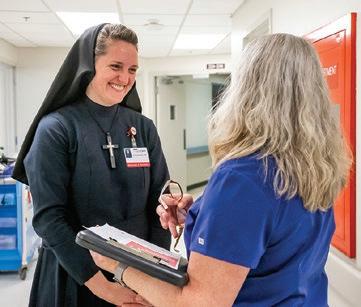
4 minute read
Inspired by the “Great Physician
Christ’s healing works are recounted throughout the four Gospels in the New Testament. In contrast to the magnitude of His life and ministry, the pages of the New Testament are thin and delicate, like butterfly wings, forcing you to slow down and contemplate the words they contain.
In John 5:6, Christ asks a man who has been infirm for 38 years: “Do you want to be healed?” Ever the noble physician, He asks permission before providing care. His words are not unlike the Hippocratic Oath to “do no harm” coined by the Greek physician Hippocrates, who died 375 years before Christ was born, whose oath every physician must pledge.
At this point in the scripture, the man is well beyond any known medical cure or treatment of the day. Yet by His divine hand Christ grants him the gift of health. Throughout the Gospels we find countless other references to Christ’s healing.
The Warrens knew these stories well. More significantly, they understood and embraced the spiritual tradition of healing, for to truly serve others, the whole person must be treated. For where science and technology fall short, God can provide.

Formal blessings are often held for newly constructed or renovated hospital facilities.

Sister Mary Benedicta Maier, RSM
“For people in medicine who do have the gift of faith or are aware of Christ working through them, every day is a kaleidoscope of mystery,” said Father Gary Kastl. “Where is Christ showing up? Where is the healing and transformation happening outside the realm of scientific explanation? Medicine is a profound playground of seeing the body’s soul manifesting what it means to be human.”



Faith is often a bond with the patient.
“To be human” includes the tenacity of one’s spirit when facing a health crisis. Regardless of what faith a patient follows, even if they have no faith at all, patients inevitably bring their spirit with them. For some healthcare providers, they want it as part of their treatment plans. Ziad Hawa, M.D., a physician hospitalist at Saint Francis Hospital Muskogee, has experienced this firsthand. He not only shares his faith with his patients, but consoles them on their terms
“Almost every day, I have the opportunity to experience Christ with my patients,” said Dr. Hawa. “I’m Middle Eastern but they’ll see the crucifix around my neck and say, ‘I didn’t know you were Catholic.’ We’ll talk, and oftentimes, I will sit at their bedside and pray with them. I see my work as an extension of my faith.”
This sacred bond between healthcare provider and patient isn’t just found in the hospital or clinic room; it steers the discussions and decisions made in the health system’s boardroom.
“I have been in Catholic healthcare since 1983. Most of that time I was an Episcopalian. It was during my time at Saint Francis that I converted to Catholicism,” said Jake Henry Jr., president and CEO of the health system. “My faith, and the faith of so many at Saint Francis, preserves us.”
As a Catholic-based institution, decisions are made based on a set of standards called the Ethical and Religious Directives for Catholic Health Care Services. “Many other hospitals have similar stated values as we do,” said Sister Mary Nika Schaumber, RSM. “But we also have two that others don’t: dignity and justice.
Dignity
Respecting each person as an inherently valuable member of the human community and as a unique expression of life.
Justice
Advocating for systems and structures that are attuned to the needs of the vulnerable and disadvantaged and that promote a sense of community among all persons. “In many ways, our values and the Ethical and Religious Directives give us the opportunities to ask ourselves, is a particular technology or treatment really helpful for the dignity of the person sitting across from us?” said Sister Mary Nika. The tradition continues. Faith endures as the cornerstone of Saint Francis, and the Catholic tradition of healing is even more important now than 60 years ago when Saint Francis first opened its doors. By staying firmly rooted in timeless Catholic virtues and values, Saint Francis has built the foundation for a state-of-the-art, world-class health system. This is not a coincidence; it is by design. “I carry Christ in my heart. It’s part of my identity and mission here,” said Dr.Hawa. “It’s so beautiful to have and see the faith in this environment. It’s what makes Saint Francis different

than any other health system.”

Sister Brigid Mary Meeks, RSM

– Ziad Hawa, M.D.






